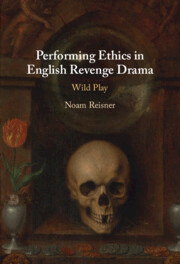Book contents
- Performing Ethics in English Revenge Drama
- Performing Ethics in English Revenge Drama
- Copyright page
- Dedication
- Contents
- Preface
- Introduction
- Chapter 1 Plot Holes and Empty Spaces
- Chapter 2 Dramatic Hyperboles
- Chapter 3 Wild Child’s Play
- Chapter 4 Marking the Ground of Revenge
- Chapter 5 Ghosting Shakespeare’s Hamlet
- Chapter 6 Passive Aggressors
- Epilogue
- Bibliography
- Index
Chapter 6 - Passive Aggressors
Chapman’s and Tourneur’s Moralistic Revenge
Published online by Cambridge University Press: 09 July 2024
- Performing Ethics in English Revenge Drama
- Performing Ethics in English Revenge Drama
- Copyright page
- Dedication
- Contents
- Preface
- Introduction
- Chapter 1 Plot Holes and Empty Spaces
- Chapter 2 Dramatic Hyperboles
- Chapter 3 Wild Child’s Play
- Chapter 4 Marking the Ground of Revenge
- Chapter 5 Ghosting Shakespeare’s Hamlet
- Chapter 6 Passive Aggressors
- Epilogue
- Bibliography
- Index
Summary
Chapter 6 turns to later revisions of Kydian revenge drama on the early Jacobean stage in the hands of idealistic playwrights who sought to reform the ambiguous theatrical experience of the original play by restoring its tragic dignity within a reconstituted Christian morality of patient suffering or rational Stoic forbearance. Looking to Chapman’s The Revenge of Bussy D’Ambois and its kindred play, Cyril Tourneur’s The Atheist’s Tragedy, this chapter explores the resulting tension when playwrights reintroduce Stoic-Christian idealism into the theatrical experience of revenge which the play’s performance ethics utterly confound morally and causally. If Chettle and Middleton explore the violence underpinning any attempt to yoke Christian moral idealism onto living and suffering human subjects, in these later plays, this process is re-examined from the idealist point of view and its sustainability.
- Type
- Chapter
- Information
- Performing Ethics in English Revenge DramaWild Play, pp. 199 - 251Publisher: Cambridge University PressPrint publication year: 2024

